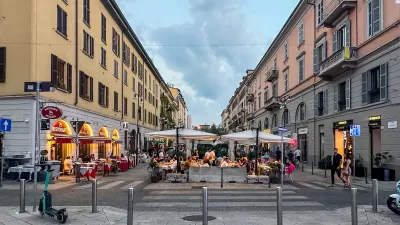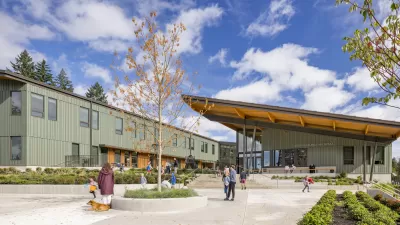A recent conference hosted by the Lincoln Institute of Land Policy focused on how planners around the world are designing urban areas that respond to the impacts of climate change.
"The plans for the 2008 Beijing Olympics are notable for their extra security amid human-rights protests. But the 2012 London Olympics' park plans are notable in that they consider a climate-changed future, in which flooding may worsen and cities must minimize carbon emissions.
London's summer-games site straddles the polluted Lea River on the east end of the city, now a moribund industrial area dotted with depressed neighborhoods. The planners looked at climate models and recognized that the area, known as the Lower Lea Valley, would likely be carrying higher flood waters from intensifying rainstorms.
Jason Prior, European regional president for the planning firm EDAW, explained one consequence of this finding at a conference on Friday: the planners ran hydrological models to determine how to widen the river and design new bridges to accommodate the higher flows. "You survey the river systems, then project forward the impact of different flow conditions, and you add the amounts the climate models are giving you," Prior said after a forum on climate change and cities at the Lincoln Institute of Land Policy, in Cambridge, MA. "You then fine-tune the channel's cross sections, change design of bridge abutments, and design wetlands to catch the extra amounts." Site work has already begun."
FULL STORY: How to Plan for Climate Change

Americans May Be Stuck — But Why?
Americans are moving a lot less than they once did, and that is a problem. While Yoni Applebaum, in his highly-publicized article Stuck, gets the reasons badly wrong, it's still important to ask: why are we moving so much less than before?

Using Old Oil and Gas Wells for Green Energy Storage
Penn State researchers have found that repurposing abandoned oil and gas wells for geothermal-assisted compressed-air energy storage can boost efficiency, reduce environmental risks, and support clean energy and job transitions.

Placekeeping: Setting a New Precedent for City Planners
How a preservation-based approach to redevelopment and urban design can prevent displacement and honor legacy communities.

San Francisco’s Muni Ridership Grew in 2024
The system saw its highest ridership since before the Covid-19 pandemic, but faces a severe budget shortage in the coming year.

Colorado Lawmakers Move to Protect BRT Funding
In the face of potential federal funding cuts, CDOT leaders reasserted their commitment to planned bus rapid transit projects.

Safe Streets Funding in Jeopardy
The Trump administration is specifically targeting bike infrastructure and other road safety projects in its funding cuts.
Urban Design for Planners 1: Software Tools
This six-course series explores essential urban design concepts using open source software and equips planners with the tools they need to participate fully in the urban design process.
Planning for Universal Design
Learn the tools for implementing Universal Design in planning regulations.
Heyer Gruel & Associates PA
City of Moreno Valley
Institute for Housing and Urban Development Studies (IHS)
City of Grandview
Harvard GSD Executive Education
Salt Lake City
NYU Wagner Graduate School of Public Service
City of Cambridge, Maryland





























